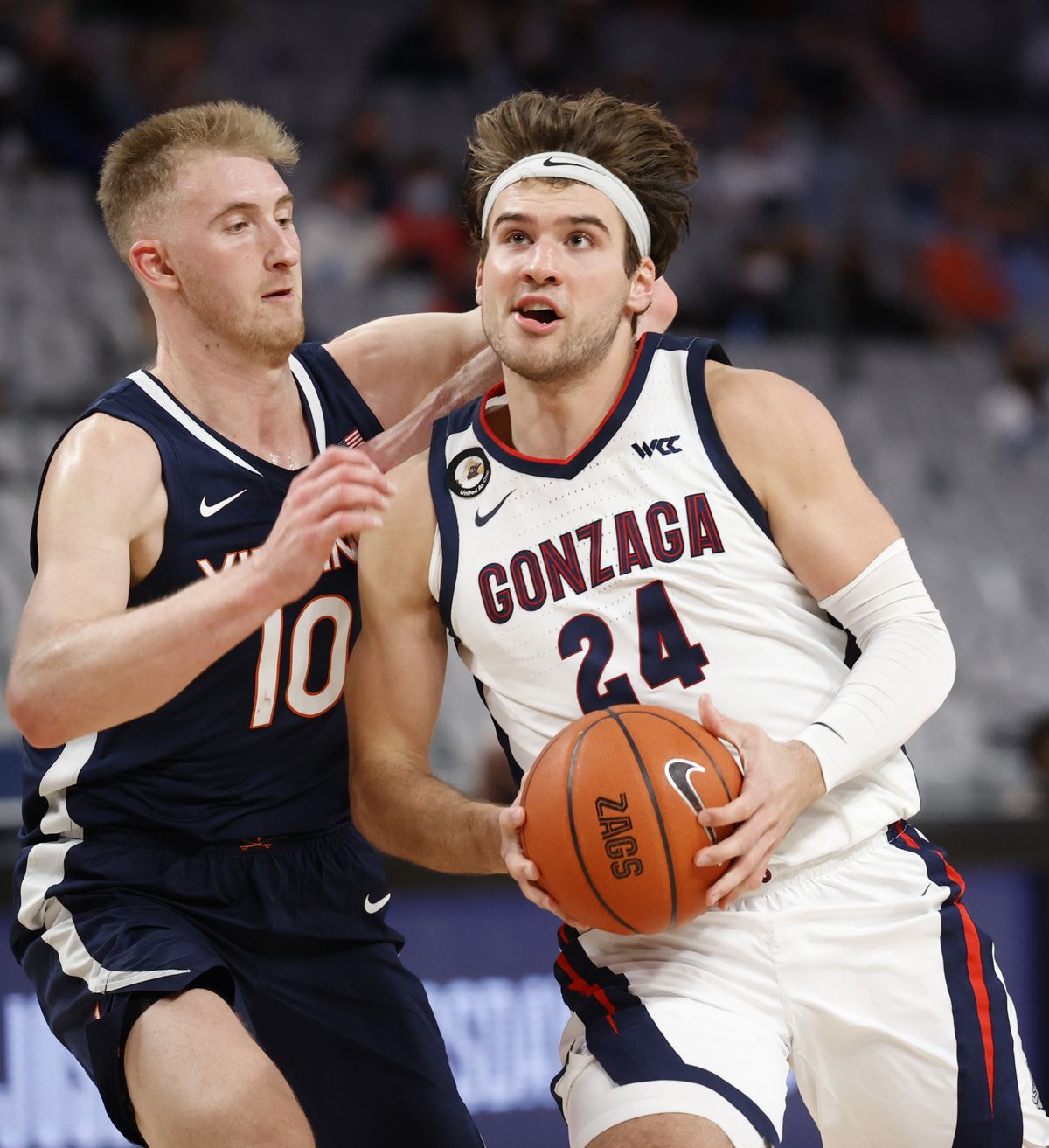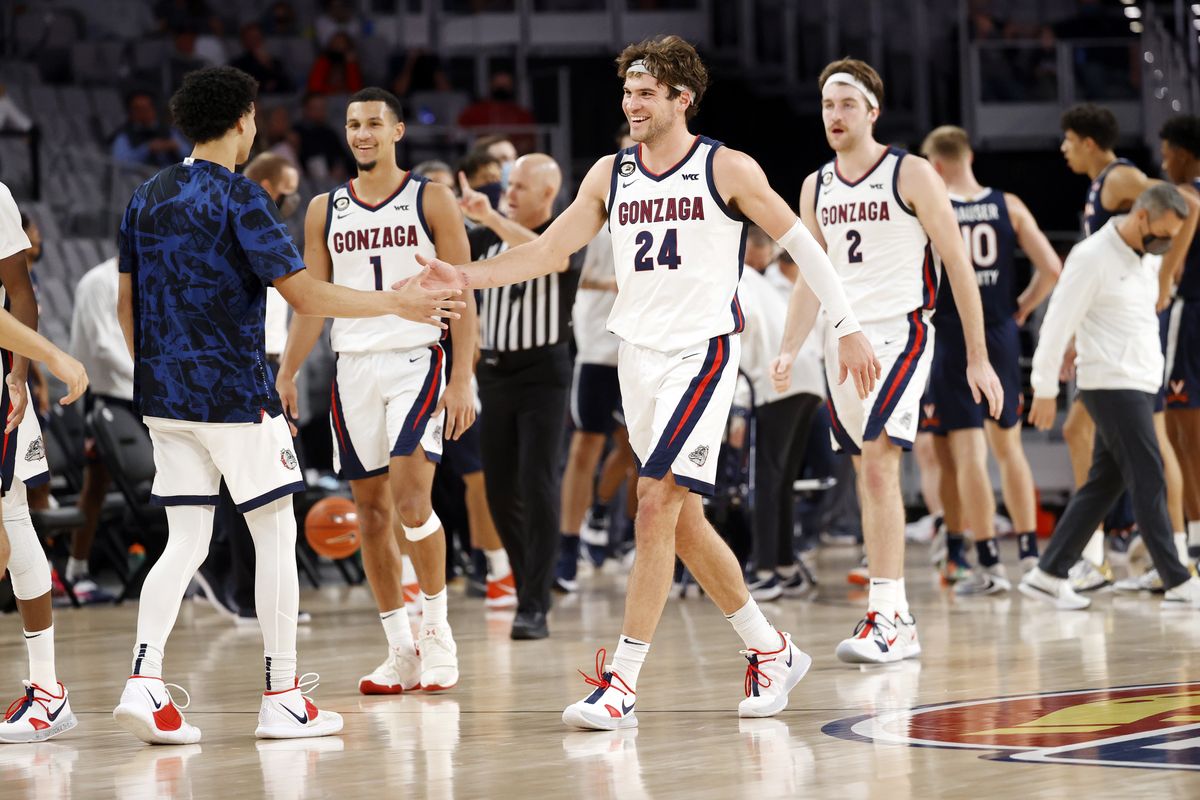Analysis: Gonzaga rolls past another ranked foe, dominates No. 16 Virginia 98-75

Gonzaga made quick work of Virginia. That’s nearly impossible to do.
Add Virginia next to Kansas, West Virginia and Iowa on the list of marquee opponents unable to slow down the Zags’ polished offense. That’s becoming almost routine.
Add up victories over Kansas, West Virginia, Iowa and Virginia and the Zags have four wins over AP top 20 teams in their first seven games. That’s never been done in college basketball, according to ESPN Stats and Info.
No. 1 Gonzaga’s offense was on full display Saturday in the nationally televised contest, racing down the floor, drilling 3-pointers, dominating in the half court and owning the paint, things that rarely happen against the pace-conscious, defensive-minded Cavaliers.
Not to be left out, Gonzaga’s defense shared some of the spotlight in a 98-75 rout – the Zags led by 33 at one point – over No. 16 Virginia on Saturday at Dickies Arena in Fort Worth, Texas.
“I didn’t see it going this way,” Zags coach Mark Few said. “I foresaw some kind of grinder, but our guys did a great job of asserting their will.”
And taking away Virginia’s in the process. Senior Corey Kispert has never played better, which is a tough standard to reach when one is a preseason All-American. Kispert scored a career-best 32 points and made nine 3-pointers to share the program’s single-game record with Kevin Pangos and Dan Dickau, the latter hitting nine twice.
Kispert wasn’t aware he had matched the record. He’d probably have it solo, but he spent time on the bench with second-half foul trouble and exited for good with about 5 minutes left.
“Those guys are great, both Kev and Dan, I look up to them a lot,” Kispert said. “To be in that same conversation is really sweet and I’m sure those guys are really happy for me as well, which speaks to the kind of players that come through here.”
Sophomore forward Drew Timme was unofficially named homecoming king. The Dallas native, playing in front of a sizable portion of family and friends among the 2,500 allowed to attend, had a career-high 29 points and eight boards.
He dominated the matchup against 7-foot-1 senior center Jay Huff and the rest of the Cavaliers’ frontcourt.

“It was just great to get him back home. He has so much pride in the Lone Star State, he reminds us daily of that,” Zags coach Mark Few said. “For him to be able to do that, especially against a Virginia-based, (coach) Tony Bennett-style defense that doubles the post really hard … he made a couple plays out of that double early and once they saw that we had a plan, I think that opened up some things 1-on-1 and he took full advantage.”
Gonzaga began pulling starters in the final 5 minutes but still nearly reached 100 points. The 98 points were the second most against Virginia in Bennett’s 12 seasons. Washington is the only team to reach 100, scoring 106 in November 2010, Bennett’s second season.
“They hurt us in areas we tried to work on – transition defense, making them shoot contested shots and taking care of the ball,” Bennett said.
It happened quickly, thanks to the Zags’ precise execution. Virginia coughed up the ball on its first three possessions and Gonzaga scored on its first three.
GU led 18-5 after Andrew Nembhard, who came off the bench after starting the previous game, drained a pair of 17-foot jumpers. It wasn’t all offense. Virginia went without a field goal for just over 5 minutes as Gonzaga extended its lead to 36-16.
The Cavaliers closed with a 7-0 run to trim GU’s halftime lead to 44-31, but a trio of Kispert 3s pushed GU in front 62-38 with 16 minutes left.
“We had the right mindset in trying to come back, but I definitely think a couple of us were scared,” Virginia point guard Kihei Clark said. “I don’t know if it was because we were playing Gonzaga or the moment, but you could kind of feel it a little bit.”
Nembhard had eight assists and Jalen Suggs’ six as the Zags handed out 26 assists, tied for seventh in school history, Gonzaga shot 60.3% from the field, the highest against Virginia since Xavier in January 2008, when Bennett was coaching at Washington State.
“It speaks volumes about their feel for the game,” Few said. “I feel like we’re making right basketball play a lot of the time and then just innately how unselfish they are. They like each other, they like passing. Consequently, those teams are hard to guard when the ball is moving like that and you don’t necessarily know defensively where it’s going to come from.”